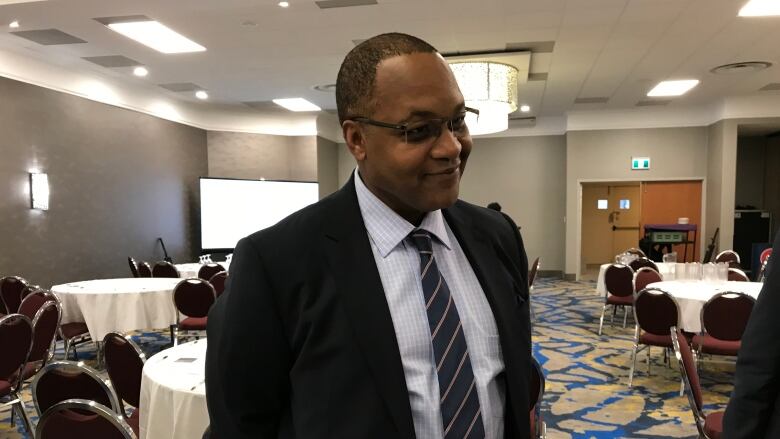Sudbury review hears police still carding people 'out of nowhere'
Despite being made illegal in 2017, practice of random police stops without cause still reported

An Ontario judge has wrapped up his review of independent street checks, a police practice more commonly referred to as "carding."
Carding is when a police officer randomly stops a citizen and asks for identification without justification, and it's been illegal in Ontario since January2017.
The province appointed Judge Michael Tulloch to travel to Ontario communities and conduct public input sessions, to gauge whether police interactions with people are consistent, free from bias, and performed in a way that promotes public confidence.
Sudbury was the final public meeting with 11 meetings across the province taking place before that.
In Sudbury, in addition to the public meeting on Monday, Justice Tulloch met with about 100 people privately to seek feedback on street checks legislation. All the feedback he collected will be considered in his report.
Three police officers from Ontario Provincial Police and Greater Sudbury Police Services were also in attendance, but said they were not representing their employers.
'No apparent reason' for stopping students
Anish Sethi, a second year student at Laurentian University, said he was carded outside of his house while taking a walk with his brother.
"The thing that bugged me was that there were no apparent reason, but we were asked if we had something in our pocket," Sethi said. "Out of nowhere, when it is happening, you're made to feel like you've done something wrong when you haven't."
"I was kind of scared. I asked [the police officer] what was wrong, and he said nothing."
"I don'tknow if it had something to do with race," Sethi added. "Because he saw two brown people walking down the street, because I don'tsee any other apparent reason. Because we weren't told any other reason."

Toronto's Cecil Peter has followed the sessions closely. He said he hoped to lend his voice to the discussion, after attendingsessions in Toronto, Brampton, Hamilton in Ottawa.
Peter said he said he was also carded in Ottawa.
"I went to buy gas, and before I was set to leave, a cop came up to me," he said. "I said, 'You're carding me,' and he went on the defensive."

Cory Roslyn, the executive director of Sudbury's Elizabeth Fry Society, an organization that helps young women who are in danger of coming into conflict with the law, said she came to provide input on carding, but also thinks it's difficult to call what's happening in Sudbury "carding."
"It's not as simple as they make it seem," Roslyn said. "We do work with a lot of people who feel they've had pointless interactions with police."
"I would say most people are fearful of interactions with police," she added, "Being charged and going to jail, ultimately."
Tulloch's report is expected to be on the desk of the Minister of Community Safety by November. The recommendations are expected to be made public in January2019.












_(720p).jpg)


 OFFICIAL HD MUSIC VIDEO.jpg)
.jpg)



























































































